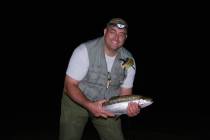NBC misses golden moment for shooters
The world's focus this week has been on London and the Summer Olympics. As always, gymnastics and swimming have dominated NBC's coverage, and while the country has closely followed the achievements of the women's gymnastics team and Michael Phelps' pursuit of additional hardware, two American shooters quietly made a little Olympic history of their own.
Kim Rhode and Vincent Hancock shot their way to gold medals in the women's and men's skeet competitions, both setting Olympic records in the process.
Rhode, a 5-foot-4-inch shooting phenom, became the first U.S. Olympian to earn an individual medal in five straight games, and she did it in grand fashion. With nerves of steel and lightning-fast reflexes, the 33-year-old tied a world record by dusting 99 of 100 clay targets.
Rhode's Olympic career began at the Atlanta Games in 1996 when, as the youngest member of the U.S. team at age 17, the Whittier, Calif., native won the gold medal in double trap and became the youngest female gold medalist in the history of Olympic shooting. She followed up that performance with a bronze in double trap at the 2000 Olympics in Sydney and gold at the Athens Games in 2004. In 2008, Rhode took home a silver medal in skeet from Beijing.
Hancock, a sergeant in the U.S. Army and Georgia resident, eclipsed his own Olympic record by breaking 123 of the 125 clay targets thrown during qualification and shooting a perfect 25 in the final. With his final score of 148, Hancock became the first skeet shooter to win back-to-back Olympic titles. Out of the 300 clay targets thrown to him during the two Olympic competitions, Hancock missed only seven.
In an interview for NBCOlympics.com, Rhode spoke about visualizing the perfect shot.
"I don't really think about it. It's so automatic for us when we step up on that station," she said. "It's kind of like walking for you. When you walk down the street, you don't think right, left, right, left. You just do it.
"I'm actually focusing more on myself, my heartbeat, calming myself down, as well as looking at the surroundings. Is it windy? Is it raining? What are the conditions? What is this bird going to do next?"
For Rhode and Hancock, the next step was automatic. See the target, shoot the target. And that's the great thing about the shooting sports. They are straightforward, with no subjective scoring from a panel of "impartial" judges, no commentators wondering whether the athlete bobbled the shotgun while swinging right to left or whether the shoulder moved too far backward in reaction to the gun's recoil. A hit equals a point. A miss doesn't. The athlete with the most points wins.
Unfortunately, America will never see the shooting sports on TV in their entirety. They don't just take a backseat to swimming, gymnastics and beach volleyball; they are kept in the trunk.
However, if you dig around the Olympic website you will find the highlights. They are worth watching. Just don't break out the popcorn, because you won't be there long.
Freelance writer Doug Nielsen is a conservation educator for the Nevada Department of Wildlife. His "In the Outdoors" column, published Thursday in the Las Vegas Review-Journal, is not affiliated with or endorsed by the NDOW. Any opinions he states in his column are his own. He can be reached at intheoutdoorslv@gmail.com.

















